Review: South Coast Repertory Presents World Premiere Play GALILEE, 34
Featuring an engaging script and powerful performances led by Amy Brenneman, Eleanor Burgess’ brilliant new play captures Biblical players with humor and humanity.
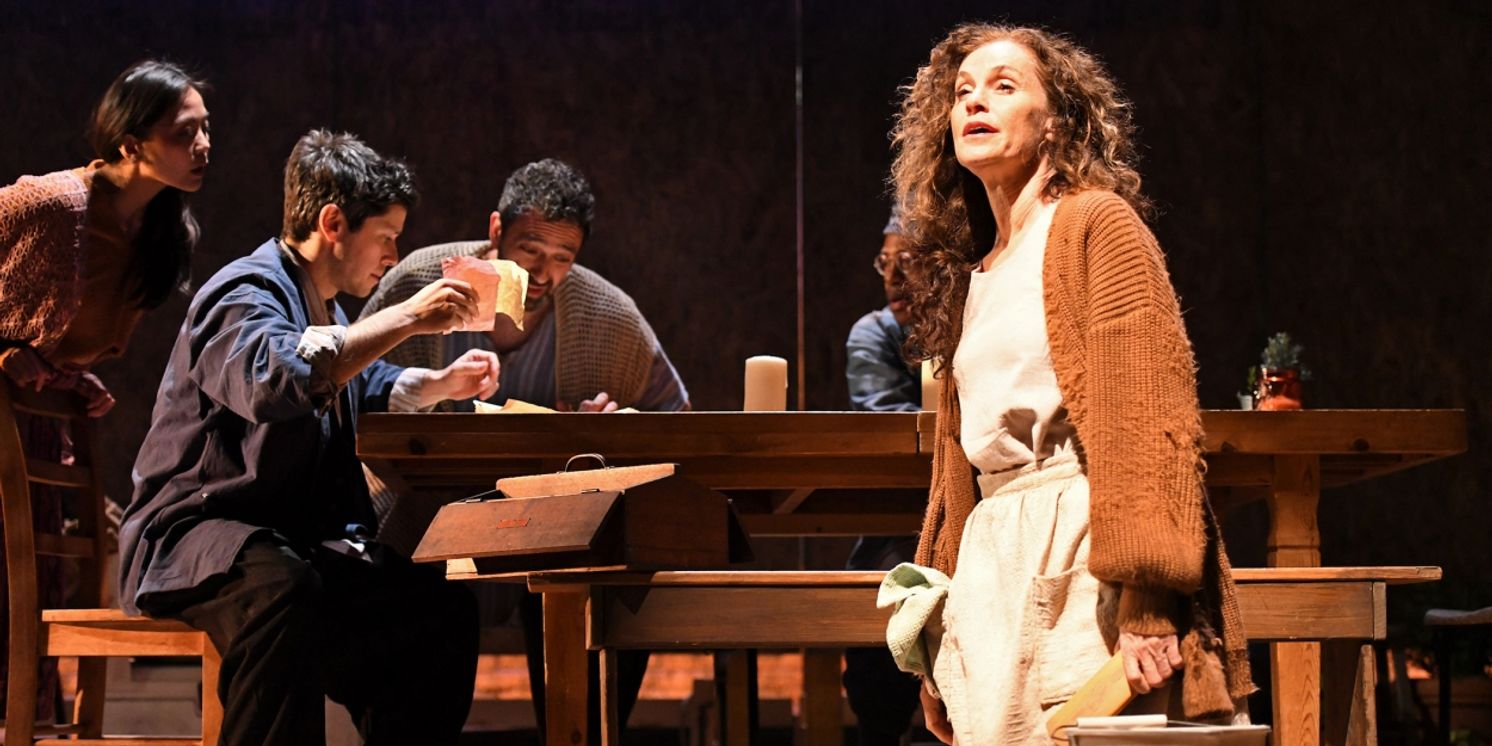
"None of this happened. But, I promise… all of it is true."
It's a line of dialogue declaratively uttered directly with a slight knowing, tongue-in-cheek tone to the audience in playwright Eleanor Burgess' brilliant, thoughtful, and often bitingly funny new play GALILEE, 34—currently having its impressive world premiere production at OC's South Coast Repertory in Costa Mesa, where it continues performances through May 12, 2024, under the direction of Davis McCallum.
The line is spoken right off the bat—and basically preps viewers for what's about to transpire in this play's two humorously insightful, beautifully-performed acts: an almost fly-on-the-wall, unreliably revisionist examination of supposed events and interactions that occurred amongst a group of well-intentioned (and Biblically well-known) men and women who were formerly associated with some preachy, kind-hearted, miracle-performing dude named Yeshua—better known around the world as the one and only Jesus Christ, the apparent son of the Great Almighty himself.
But, more than anything, the line also highlights the very core of this play: how stories are often diluted and re-interpreted the farther away its present witnesses are from the actual truth. And sometimes, these stories are also slightly tweaked for dramatic purposes—to make them more interesting and, perhaps, more convincing of a movement's central values to increase their flock.
Additionally, the play also points out that, at times, ordinary men (yup, mostly men) are often idolized to be waaaay more than what they truly are in reality.
Well, it probably doesn't help things that such stories—distributed as lesson-ladened "gospels"—are sometimes just embellished writings that are heavily curated and edited, nit-picked, lazily paraphrased, or dubiously repurposed in order to deliver a desired message to push a certain agenda, even if it means fibbing the actual truth a little.
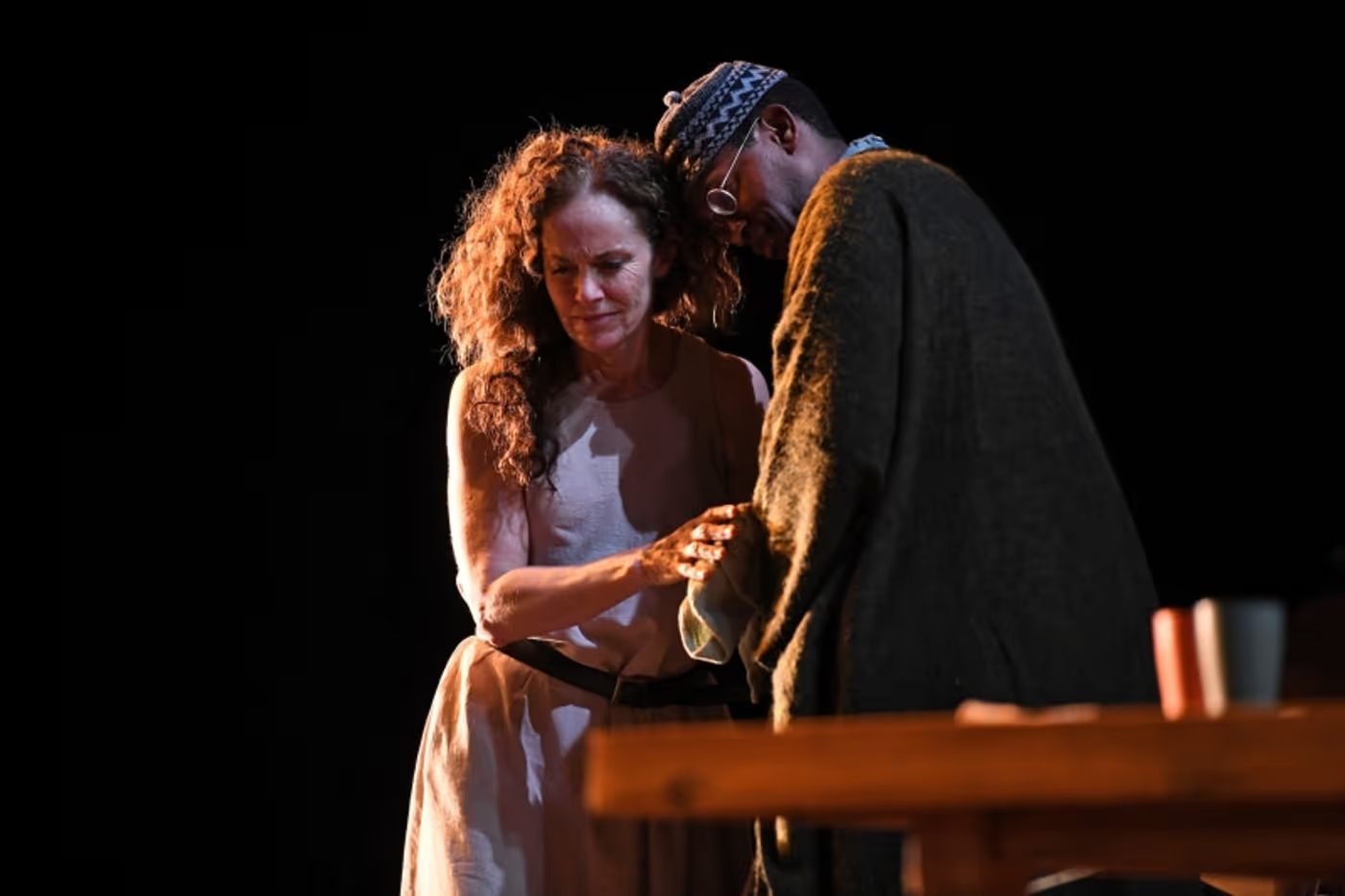
Photo by Robert Huskey / SCR.
It's certainly something we can already assume has always been the case throughout history, but GALILEE, 34 posits that, yes, even in these early days, some underlying nefarious activities are afoot here in the guise of something "good." So… yeah, such actions appear to be just as prevalent back then as they are in our modern-day world of 24-hour news and social media commentary.
Set in 34 AD within the dusty, poverty-stricken desert of Galilee—Yeshua's former home turf—nearly a year after his crucifixion (and his dead body's mysterious "disappearance" some days after), GALILEE, 34's engagingly imagined narrative focuses on a small gathering of his former followers and loved ones, all of whom have regrouped and congregated here in this locale to physically document (as in, jot down) the core tenets of their charismatic former leader's teachings, and then, perhaps, talk next steps, since this great humanitarian, miracle healer, and main talking head has definitely left this earthly plain and didn't exactly leave behind an instruction manual.
Clearly, everyone seems to still be in mourning, and are now all caught in the ennui of being in flux.
For the group, adopting a simplistic "Do Good. Help fix the world" mantra just isn't enough, because Yeshua's teachings have, apparently, deeper meanings and an even bigger potential scope for global impact—if they could just keep everything he said straight and easily translatable.
Should they, uh, wait for Yeshua's promised, miraculous return? Should they just continue doing Yeshua's humanitarian deeds and keep spreading some of his better-remembered philosophies to those willing to listen? And if they decide to do so, what specific things should they preach about? And how exactly would they go about doing that to excite people again—without angering the violent ruling overlords that hover over them with metal swords and enormous tax bills?
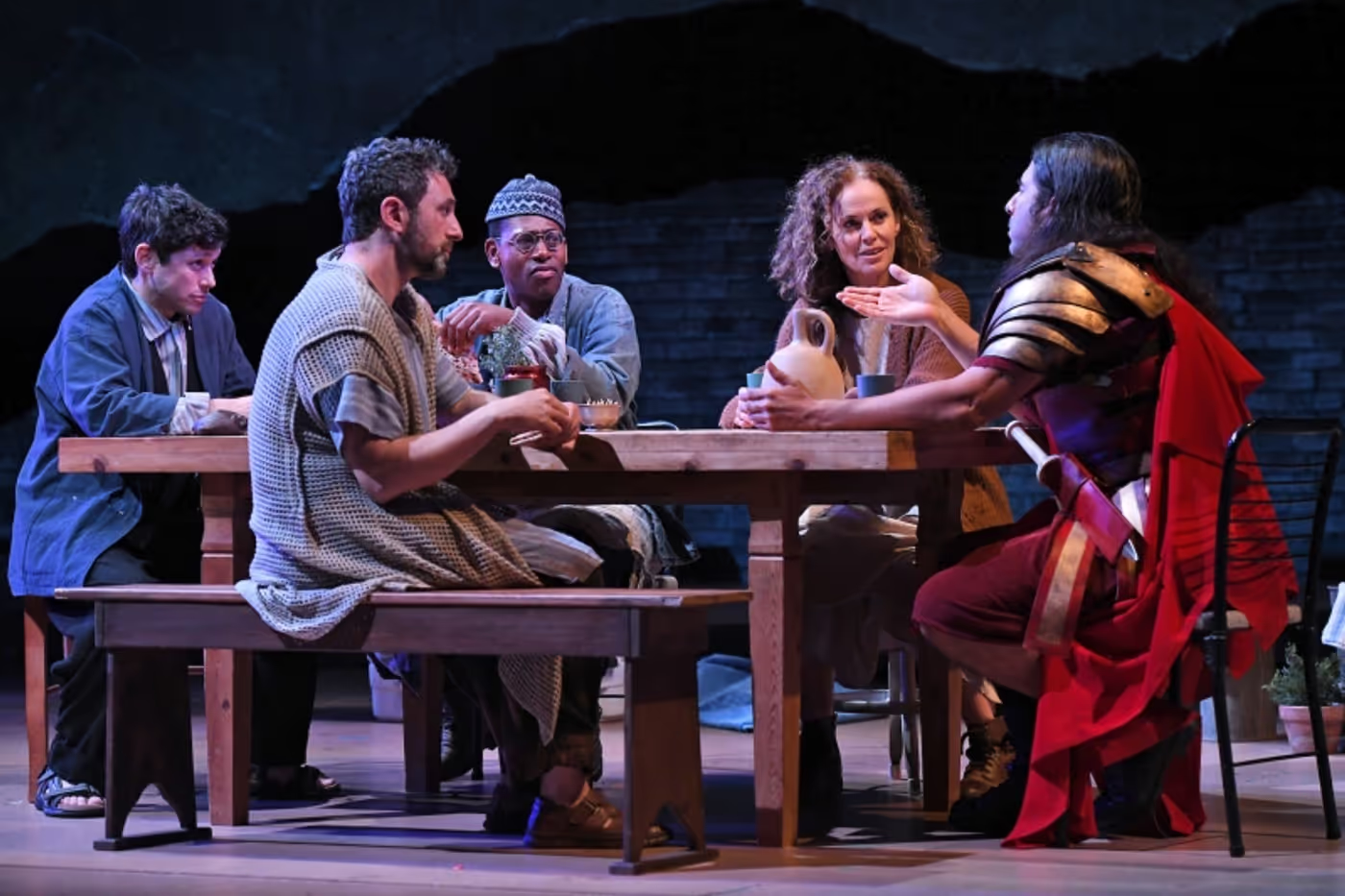
and Christopher Cruz. Photo by Robert Huskey/SCR.
In GALILEE, 34, these leftover denizens mostly gather in the large, open backyard of a modest tiny house—in an interestingly-designed, predominantly desert-hued, redneck-adjacent set by Sandra Goldmark that, surprisingly, utilizes lots of unhidden modern, post-industrial goods mixed with raw, carpenter-friendly wood planks that look like they were just recently purchased at Home Depot then hammered meticulously in place just hours before the play starts. This ancient-meets-modern hybrid aesthetic is even further mirrored by Dino El-Aziz's lived-in, old-meets-new costumes (a character, for example, wears Converse chucks with their Old Testament linens) as well as in Josh Epstein's evocative, dramatic lighting.
The home and its welcoming, fellowship-friendly backyard is owned by Miriam of Nazareth, played with admirable pathos and brave perseverance by TV's Amy Brenneman. Miriam, of course, is more widely known as the Mary from the New Testament, the very woman credited for birthing Jesus in a manger when she and her husband Joseph weren't allowed to shelter in much more hospitable accommodations.
Here, though, this revered great icon of Christianity is portrayed as a humble, more ordinary, everyday mom and homemaker, keeping herself fairly busy with various household chores, while also fetching multiple plates of food for her home's occupants and for any friend or stranger who wanders in from the streets and shows up hungry and in need.
However, there is no doubt that she is definitely in charge around here—a refreshing up-ending of the likely norm of these times which likely "put women in their place" behind the authoritative command of men.
Her subservient yet commanding demeanor suggests a steadfast woman who's been through it—shouldering a lot of deep emotional scars (I mean, she watched her own son get crucified brutally by the Romans) that she feels she must always squelch by keeping herself constantly moving and busy, lest the men try to usurp what little authority she wields at least in this household. Right from the start and in every scene she is in thereafter, Brenneman gives her Miriam a palpable strength that surrounds a cresting vulnerability that she can't quite mask from others (and us, the audience) completely.
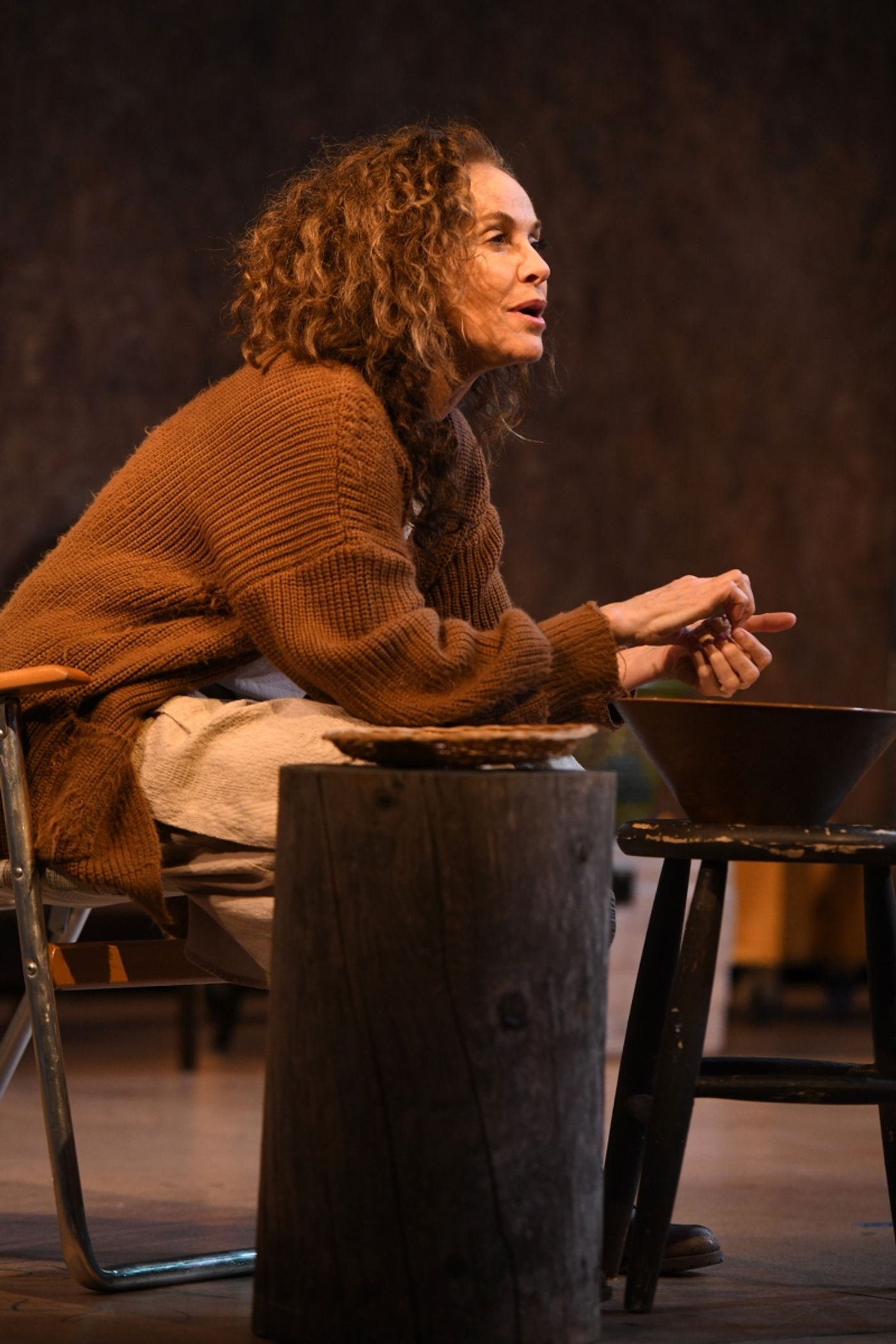
Photo by Robert Huskey/SCR.
This is my first time seeing Brenneman acting a role in person (rather than watching her act on screen) and, I must say, she is just absolutely mesmerizing in this role. Even better is that the role also has her standing on equal footing with a talented ensemble cast—while still clearly leading it.
Thankfully, Miriam isn't alone in her grief. Also living with her in her Yeshua Support Group Home is her other son, Yacov (the incredible Eric Berryman), Yeshua's sensitive, more studious brother who earnestly—but cautiously—wants to help continue what his brother started, at the very least in order to maybe finally get some attention from his mom that Yeshua always got more of before.
There's also Shimon (the amusingly sardonic Benjamin Pelteson), a former disciple—most of us know him as Peter—whose devout loyalty to Yeshua somehow also makes room for uneasy doubts, snarky observations, and petulant asides that have the same vibe as a Reddit commentary section.
And then there's Miri (the captivating Teresa Avia Lim), Yeshua's ex-girlfriend whom (biblical) history knows better as the notorious Mary Magdalene. Since the play gives certain characters the ability to talk directly to the audience, Miri, obviously, takes advantage of this bit of theatrical magic to finally set the record straight about her much-exaggerated reputation, which I won't spoil here.
Frequent visitors to Miriam's hippie-like commune include sitcom-like drop-bys from local neighborhood gossips like Mattityahu (Jeremy Rabb) and John the Baptist's hilarious moocher mom, Elishiva (Sharon Omi), who always seems to show up just for the free food.
Soon, a young, eager intellectual named Saul of Tarsus (the superbly compelling Raviv Ullman, who gives off palpable serial killer vibes) arrives just in time to offer his services as a Torah expert, and to help establish a tangible, more substantial workflow for the group's evangelical mission, and to, oh… perhaps insert some of his more out-of-the-box ideas into the already unorganized mix.
A recent convert—despite being the only one amongst this group to never actually having met Yeshua in person—Saul believes the teachings they will now spread don't have to necessarily be totally accurate… just compelling and interesting enough to engage the faith of their followers (well, target audience).
"When there's more than one story, you can just follow what works for you!" he gleefully ascertains.
What makes Saul truly sus, though, is his desire to compel the group to, perhaps, embrace a new direction and methodology for the burgeoning new global movement they are starting that may or may not be beneficial for the future or in total alignment with Yeshua's original vision, which Miriam instantly (and rightly so) sees as a red flag.
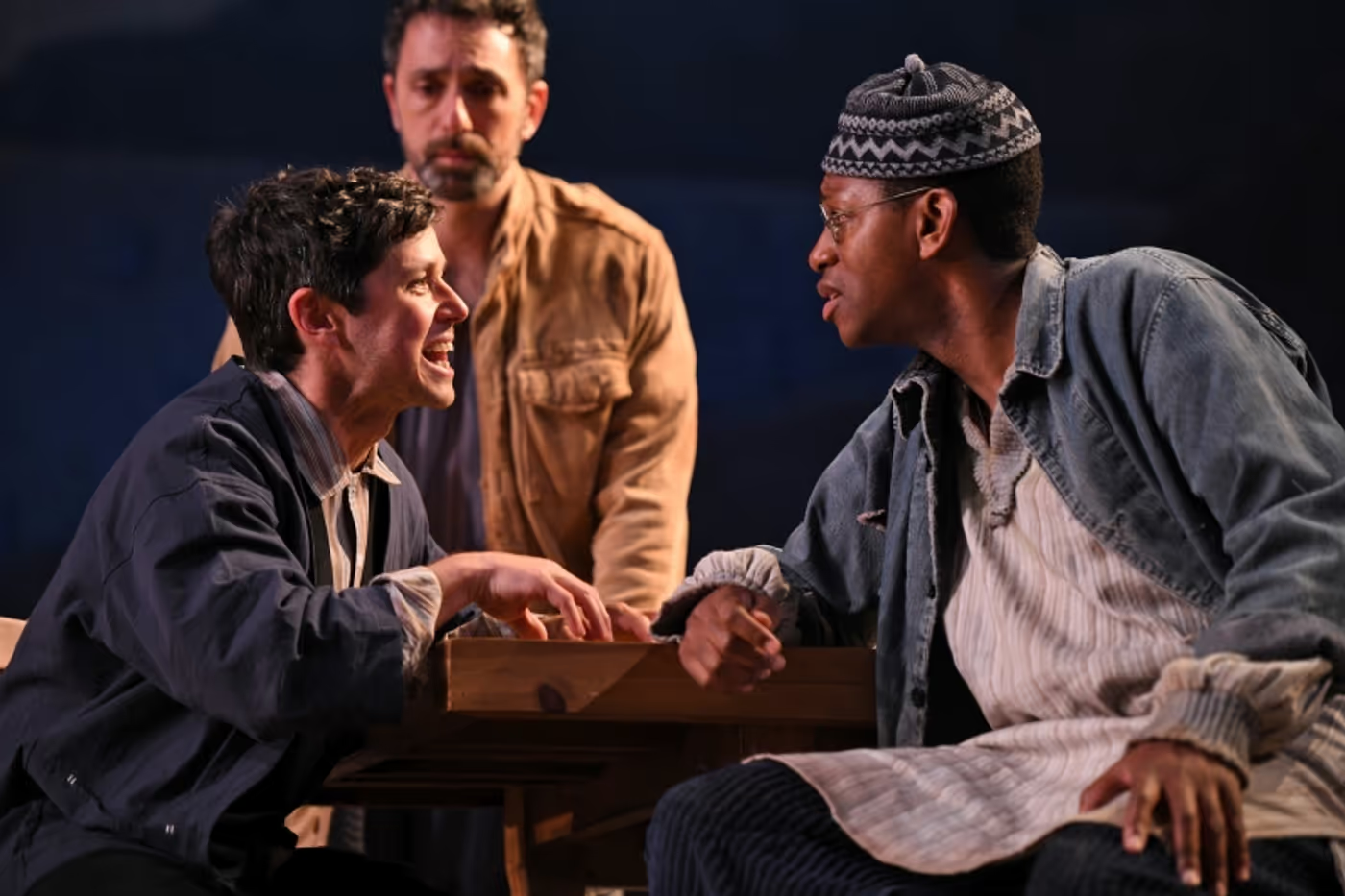
Photo by Robert Huskey/SCR.
As he becomes more ensconced into the "family business," Saul certainly isn't shy about resorting to manipulating the real details of the Yeshua stories/teachings to support and promote his own expansion agenda (by the way, Saul, we learn, is the future St. Paul!).
The terrific Christopher Cruz rounds out the cast in two key minor characters that create such booming impacts with each oh his roles' arrivals.
First—in the play's first true moment of heart-stopping drama that got me to sit up riveted, Cruz dons a chipper smile, a semi Valley-girl/entitled influencer accent, and a Roman Soldier's armor to play Linus, who has come to collect back taxes and to basically mock and scare the shit out of the group. Later, Cruz then returns in another role, this time as an unkempt stranger dressed in homeless rags that arrives under Saul's invitation to partake in some food and, maybe, dispense some wisdom for the group.
But, wait… Saul invited this stranger because he thinks that maybe this smiley hobo could be the reincarnated new persona of Yeshua? Um… is he right? And, while we're at it… is Saul correct, too, in his risky ideas about how to keep the movement going?
Through relatable emotions, snarky declarations, present-day correlations, and clever, witty humor—a good portion of which is narrated directly to the audience as if they've stepped inside a reality TV confessional booth to reveal their inner feelings about any given situation—the funny and imaginative GALILEE, 34 brilliantly tweaks what many of us know about these infamous Biblical players and, instead, unapologetically strips away the marble pedestal statuses of these revered icons and show them as just ordinary, mortal, overthinking humans capable of expressing raw feelings, which involves fully displaying their flaws, errors in judgment, deep-seeded resentments, understandable confusion and skepticism, and, yes, even a shaky relationship with their faith.
As they reminisce, analyze, and debate the accuracy and minutia of what Yeshua preached and how to best move forward in their new Yeshua-less era—while also trying to feed themselves and the less fortunate, even poorer folks among them—they begin to wonder if their once far-reaching movement even has anything worthwhile left to resuscitate, or if they could even do the movement justice working off of second- and third-hand knowledge that has been diluted and re-worked ad nauseam.
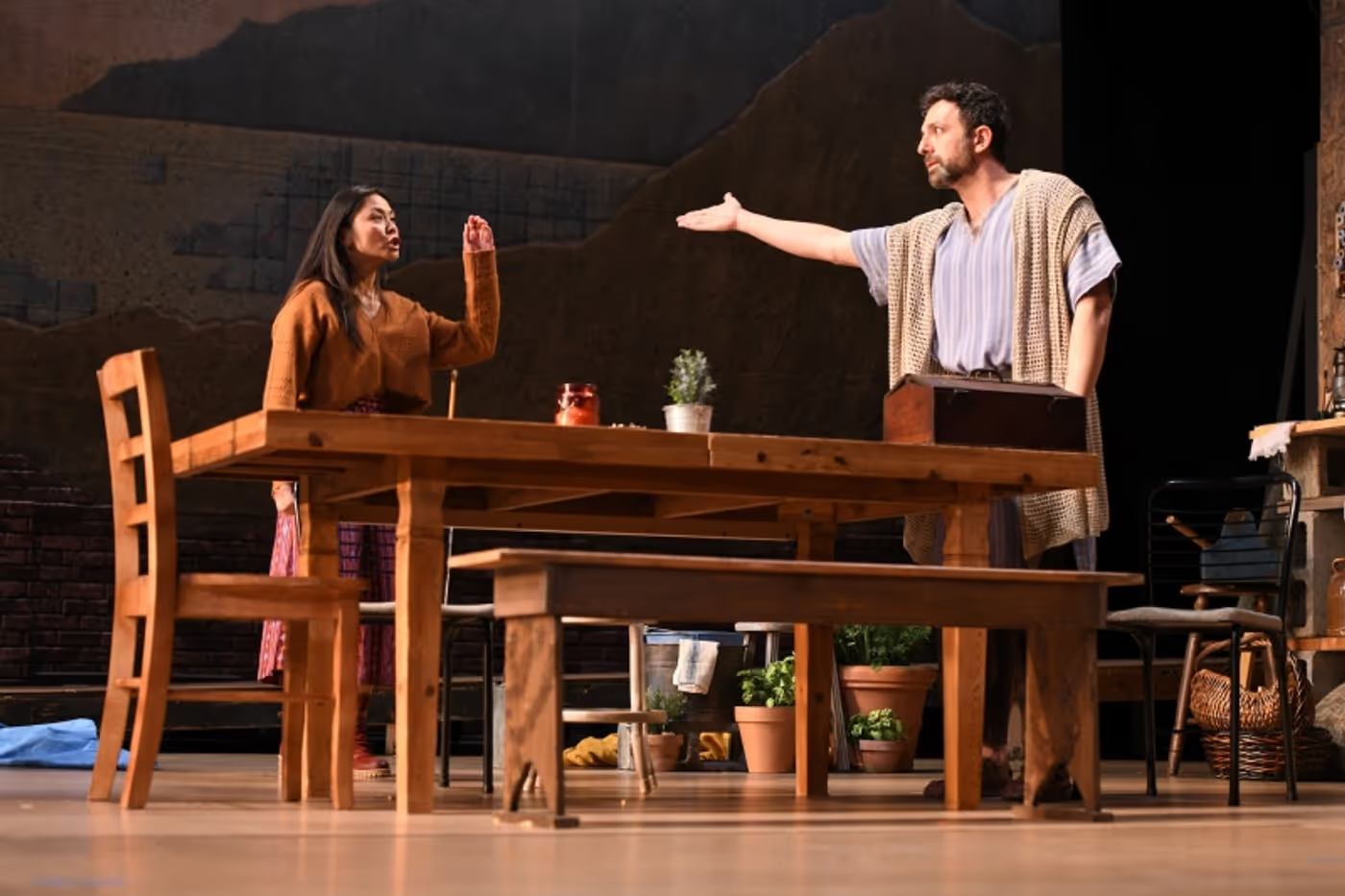
Photo by Robert Huskey/SCR.
Aside from its witty, ruminative script, GALILEE, 34 truly impresses thanks to the uniformly enthralling performances from its excellent cast, led by the superb Brenneman.
While every other character gets to deliver a funny line or ten, Berryman's touchingly beautiful performance as the nerdy, outwardly gentle Yacov is the play's kind and moral center, providing audiences with a more serious-minded proxy amongst them. Pelteson's borderline Karen-esque energy and Omi's casual, unbothered quips provide the play with plenty of chuckles. The stirring Lim's frequent narrations layered with deeply emotional resonance keeps the play grounded. Cruz's performances give off effortless humor and shudder-inducing ferocity with equal impact—showy roles he handles well and without crossing the over-the-top threshold.
And, admittedly, I was a little giddy seeing Ullman show up on stage—someone whom I fondly remember from my younger days as Phil from the Disney Channel's Phil of the Future—now here, a little older, playing such an intense role that eerily straddles self-less good intentions and self-serving, manipulative maneuvers. He is well-cast as someone that effortlessly exudes charm but also has a sinister side that kinda gives you the heeby-jeebies.
Introduced last year as a staged reading for the Pacific Playwrights Festival and has now been promoted to be a full featured stage production, GALILEE, 34 is an excellent way to conclude South Coast Repertory's 60th Season (next door at the larger theater is the current home for the Tony Award-winning theater's other new world premiere, PRELUDE TO A KISS - THE MUSICAL).
Though Burgess's world premiere play is likely still considered a work-in-progress, SCR's effectively paced presentation now playing is already off to a great start, and could only get better with future mountings (my one gripe would have to be with Rabb's peripheral walk-on characters which, though brilliantly performed, don't seem to make much of an impact in the overall story).
What makes the play incredibly approachable for both believers and non-believers is its ability to humanize its characters—previously noted before as immovable, divine figures who just had the luck of being touched by a deity directly—but are now seen as simply regular people just like the rest of us who might have just been trying to do the right thing as best as they know how.
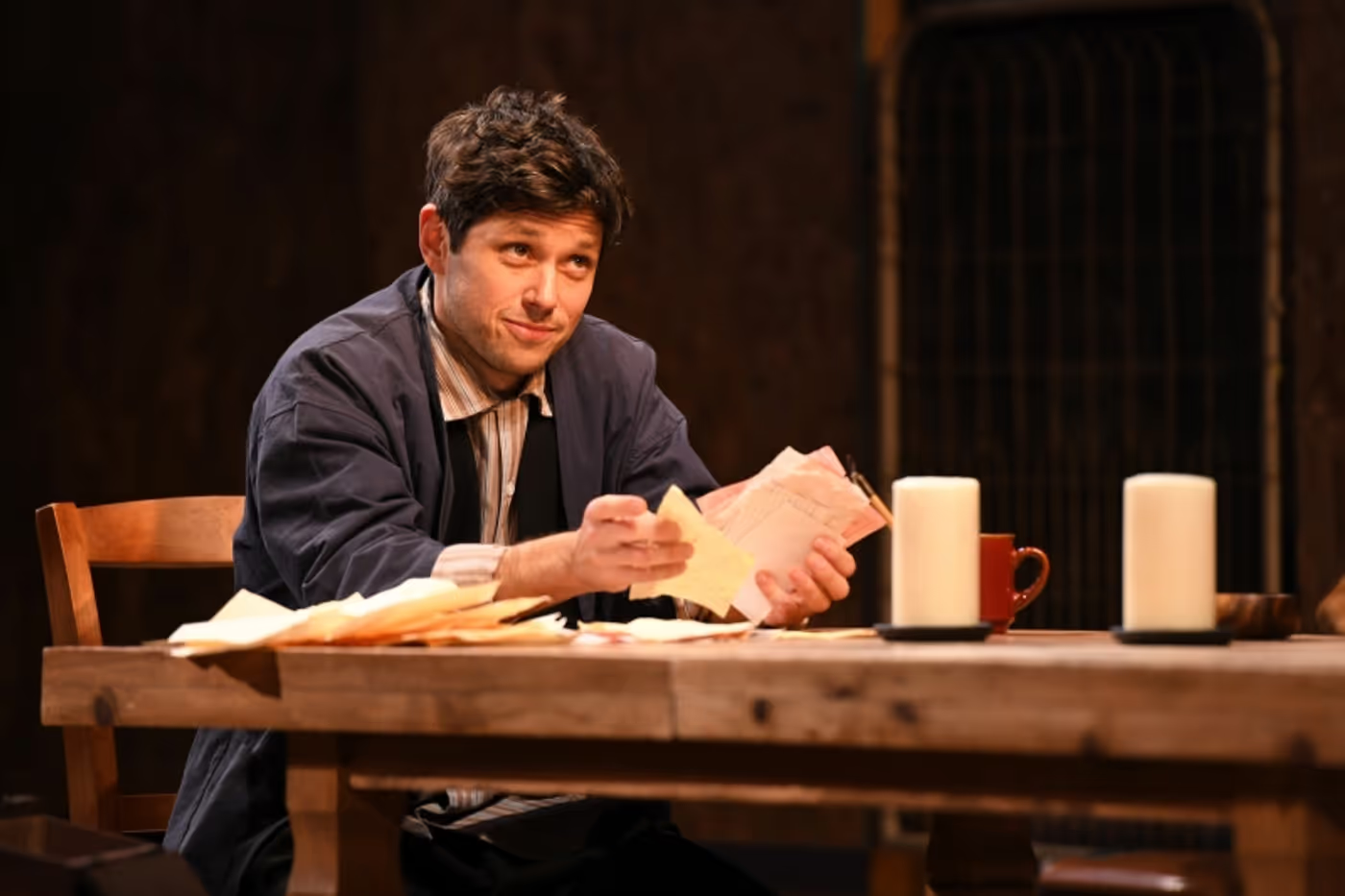
Burgess does not just offer a mere origin story for the birth of a religion and movement, it is a surprisingly earth-bound tale of what happens when stories get jumbled up by human intervention—truths get embellished, historical accounts get typos, translations use incorrect meanings, and people—and, yes, even Gods—get misquoted.
Despite this apparent criticism of how it began, Burgess never makes the play feel like a damning attack on organized religion—rather, it does give a gentle nudge for it to, maybe, just do better, and, perhaps, rethink its rigidity in what it says. As someone who has spent a childhood deeply immersed in Roman Catholicism—and subsequently learned growing up that there might be things I am incompatible with—I completely understand how important it is to know that not everything in those holy scriptures is absolute, incontestable gospel.
Clearly, GALILEE, 34 isn't meant to offend. It does, very pointedly, want to illuminate the very nature of why the details we've read within these pages aren't necessarily the whole picture and should, probably, need to have some healthy skepticism and analysis thrown its way to benefit all humankind, not just some.
Come for the great acting performances… but stay for Burgess' introspective new voice of something you think you already know.
** Follow this reviewer on Instagram / Twitter X / Threads: @cre8iveMLQ **
-----
Photos by Robert Huskey, courtesy of South Coast Repertory.
Performances of the World Premiere production of Eleanor Burgess' GALILEE, 34 continue at South Coast Repertory through May 12, 2024. Tickets can be purchased online at the button below, by phone at (714) 708-5555 or by visiting the box office at 655 Town Center Drive in Costa Mesa.
***
Reader Reviews
Videos

